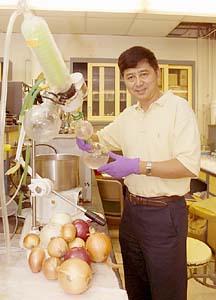Onion a day keeps doctor away? Cornell researchers find some onions do indeed have excellent anti-cancer benefits
By Susan S. Lang

Many onions are chock full of anti-cancer chemicals. However, certain varieties are particularly high in these compounds as well as more effective in inhibiting liver and colon cancer cell growth.
According to a new study by Cornell University food scientists, led by Rui Hai Liu, M.D., Ph.D., associate professor of food science, shallots, Western Yellow, pungent yellow and Northern Red onions are higher in anti-cancer chemicals than other varieties tested. Furthermore, Liu found that shallots and Western Yellow and pungent yellow onion varieties are particularly effective against liver cancer cells, while pungent yellow and Western Yellow varieties have the greatest effect on colon cancer cells.
"Our study of 10 onion varieties and shallots clearly shows that onions and shallots have potent antioxidant and antiproliferation activities and that the more total phenolic and flavonoid content an onion has, the stronger its antioxidant activity and protective effect," says Liu.
Phenolics and flavonoids are types of phytochemicals -- antioxidant chemicals that protect plants against bacteria, viruses and fungi. Phenolics and flavonoids, like other antioxidants, help prevent cancer by mopping up cell-damaging free radicals and inhibiting the production of reactive substances that could damage normal cells.
The Liu group's study of varietal differences in phenolic and flavonoid content and antioxidant activities of onions against cancer cells is online athttp://pubs.acs.org/journals/jafcau/index.html . The study also will be published in the October issue of the Journal of Agricultural and Food Chemistry .
Liu found that shallots had six times the phenolic content of the onion variety with the lowest content (Vidalia). Western Yellow onions had 11 times more flavonoids than Western Whites, the onions with fewest flavonoids.
Using colon cancer cells treated with extracts from the 10 onion varieties and shallots that were tested, the Liu group found that pungent yellow and Western Yellow onion extracts provided the strongest anti-proliferation protection against colon cancer cells. The Western Yellow, shallot
and pungent yellow extracts provided the strongest anti-proliferation protection against liver cancer cells.
"Onions are one of the richest sources of flavonoids in the human diet," Liu points out. "And flavonoid consumption has been associated with a reduced risk of cancer, heart disease and diabetes. Flavonoids are not only anti-cancer but also are known to be anti-bacterial, anti-viral, anti-allergenic and anti-inflammatory."
Onions are also the world's second most important horticultural crop, with an annual retail value in the United States of more than $3 billion, according to Liu and his co-authors: Jun Yang, a Cornell graduate student in food science; Katherine J. Meyers, a Cornell undergraduate student in food science; and Jan Van der Heide of Cornell Cooperative Extension of Oswego County.
New York state is ranked seventh in total volume of U.S. onion production, and three of the four of the varieties with the greatest total phenolic and flavonoid content are grown in the state (pungent yellow, Northern Red and shallots).
"Although milder onions are becoming more popular, the bitter and more pungent onions seem to have more flavonoid compounds and appear to be more healthful," says Liu.
Because researchers now believe that about one-third of cancer cases could be prevented by diet, the National Cancer Institute and American Cancer Society recommend that Americans consume at least five servings of fruits and vegetables a day. A number of other studies have found that phytochemicals and antioxidants are the chemicals in fruits and vegetables that could be effective against cardiovascular disease and certain cancers, such as lung cancer, prostate cancer and melanoma.
The study was funded, in part, by the New York State Department of Agriculture and Markets.
Media Contact
Get Cornell news delivered right to your inbox.
Subscribe